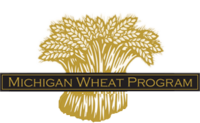Take advantage of the great looking wheat crop in the Great Lakes State!!
After scouting wheat fields this spring and examining the crop while applying nitrogen, many growers are saying this could be a wonderful wheat year in the Great Lakes State. Given the great crop outlook, the Michigan Wheat Program is reminding growers to sign up for the Michigan and National Yield Contests.
“We know that most growers don’t like being in the spotlight,” said Michigan Wheat Program executive director Jody Pollok-Newsom. “However, to improve everyone’s knowledge level it is important to highlight the high-quality, high-yielding crop grown here. One of the best ways to do that is through the yield contests.”
“Not only are others watching to see the annual size of our crop, but also what gains are being made in quality and yield as they plan for processing and their buying needs,” Pollok-Newsom said. “We are lucky to have so many processors and end users in our region, but we also need to make sure they know what a strong crop wheat is in our state.”
It’s easy to sign up for the yield contests. In a single application process Michigan growers can participate in both the state and national yield competitions. The deadline to register for the 2023 contest is May 15! To enter the national (and Michigan) contest visit https://yieldcontest.wheatfoundation.org/ to review the rules, regulations, link to create an application account, and see winners from previous contests.
There is a fee of $100 per entry. However, there are many industry partners that offer (free) entry vouchers. Look at the entry form and select which voucher you’re applying to use for your entry payment; it’s that simple to have your entry paid.
Also, through a partnership of the Michigan Wheat Program and National Association of Wheat Growers, since all Michigan growers pay into the check-off program, all Michigan growers are members of NAWG. So, there is also no need to get a NAWG membership.
National winners are determined by the percent of their local county average wheat yield and broken down by marketing class. Top national winners receive a trip to the Commodity Classic.
Michigan follows the national rules and procedures for entering, collecting data and reporting yields. However, in Michigan, winners are determined based on bushel/acre yield, not percent of county yield.
Michigan Winners will be selected in the categories of irrigated and dryland wheat, in both red and white wheat. Michigan winners are announced at the Michigan Wheat Program’s Annual Meeting held each winter and receive free registration to Michigan’s Great Lakes Crop Summit held in January.
– – – – – – – –
2022 Michigan and National Wheat Yield Contest winners
Outstanding growers are a vital part of Michigan’s strong wheat industry, and those top-yielding growers recognized in the Michigan Wheat Yield Contest and the National Wheat Yield Contest for the 2021-2022 growing season are listed below.
2022 Michigan Wheat Yield Contest Winners
Dryland Soft Winter Wheat
#1 – Randy Eschenburg, Lapeer County at 130.2 bu./acre
#2 – Mike Milligan, Tuscola County at 117.2 bu./acre
Dryland Soft Red Winter Wheat
#1 – Nick Suwyn, Barry County at 138.1 bu./acre
#2 – Dwight Bartle, Sanilac County at 128.8 bu./acre
#3 – Nancy Bartle, Sanilac County at 126 bu./acre
Irrigated Soft Red Winter Wheat
#1 – Nick Suwyn, Barry County at 149.9 bu./acre
– – – – – – – –
2022 National Wheat Yield Contest (NWYC) Winner
NWYC Overall State Winner for Michigan
Nick Suwyn, Barry County at 149.9 bu./acre
– – – – – – – –
The Michigan Wheat Program board extends a hearty congratulations to all the 2022 winners – and looks forward to even more winners in 2023! But growers have to enter now!
The Michigan Wheat Program is funded by nearly 8,000 farmers who grow wheat in 50 of Michigan’s 83 counties. The Michigan Wheat Program board seeks to promote the state’s wheat industry by funding and supporting the strategic priorities of wheat farmers working with input suppliers, seed producers, millers, end users and consumers. Research on wheat production practices and grower education has been a continued focus for the organization.
